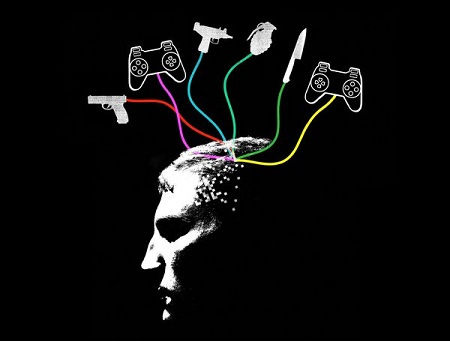Do video games really promote violence? Yes.

March 5, 2018
Video games, a male-dominated field of entertainment, were once played by entire families. Brothers and sisters would compete to see who could survive Pacman the longest and other fun T.V. games. This all changed after the great video game crash of 1983, also known as “Atari Shock” in Japan.
However, Nintendo saved the video game industry by strategically marketing video games as a toy to young boys, which changed the video market forever.
Companies like SEGA, Capcom and others started targeting teen boys by making games more aggressive, as boys prefer to do more dangerous and risky tasks.
This changed the video game market forever. More and more violent games started emerging that attracted more teenage boys. First person shooting games like “Doom,” “Counter Strike” and free world games like “Grand Theft Auto” started promoting violence.
Games became more graphic with the advancement of technology. Now eight out of the top 10 video games are violent.
There are many ways video games can affect our brains. Some games are like exercise for your brain and can help you make strategic moves in real life, but there are other games that don’t require as much brain power.
We can do whatever we want in those games. Games like Grand Theft Auto make violent activities like car theft and shooting people on the streets look more glamorous.
Although there is no concrete scientific evidence that violent games make people violent, there are still some cases where gamer teenagers did act out in violence.
For example, in Munich, Germany, an 18-year-old gunman responsible for killing people in July 2016 was a fan of first-person shooting games.
The American Psychological Association’s research demonstrated a link between violent game use and an increase in aggressive behavior.
It is all due to the rewarding system of the game. When your character in a game kills someone or does something aggressive, the game rewards you. Extra points for catching the “bad guy.” This creates a misconception in our brain that killing is good.
Young children are getting more affected by these video games. Researcher L. Rowell says that violent video games may have an even greater impact on young children than children who watch a lot of violence on television.
There are also many video games that portray women as weak characters. So, boys often think of girls as inferior, and they fail to be respectful. Children can also pick bad language from video games.
Sometimes violence can happen in another form. When a person fails to complete a given task in the game, they might express their anger through mic or even a person. This activity is commonly known to gamers as, “rage-quitting.”
Video games may not be a direct cause for violence, but in some ways, video games do affect our brains and make us relatively more aggressive. Young teenagers playing violent games may grow up to be more violent than the ones who don’t.
People playing first-shooter style games are likely to adopt a detached view of society. They develop aggressive thoughts and tendencies. Even though video games do not affect us in a direct way, it is affecting us on a micro-level. That’s how video games are promoting violence.



Mason • Mar 8, 2018 at 10:59 am
To all the people who believe that Video Games cause violence: Thats a bit like saying “There is more crime in the summer, more ice cream is sold in the summer, therefore ice cream causes crime.” That not how legitimate research works!
Terrick • Mar 6, 2018 at 2:35 pm
The people who share their views on game violence are always the ones who have never played such games.. this article is flawed.